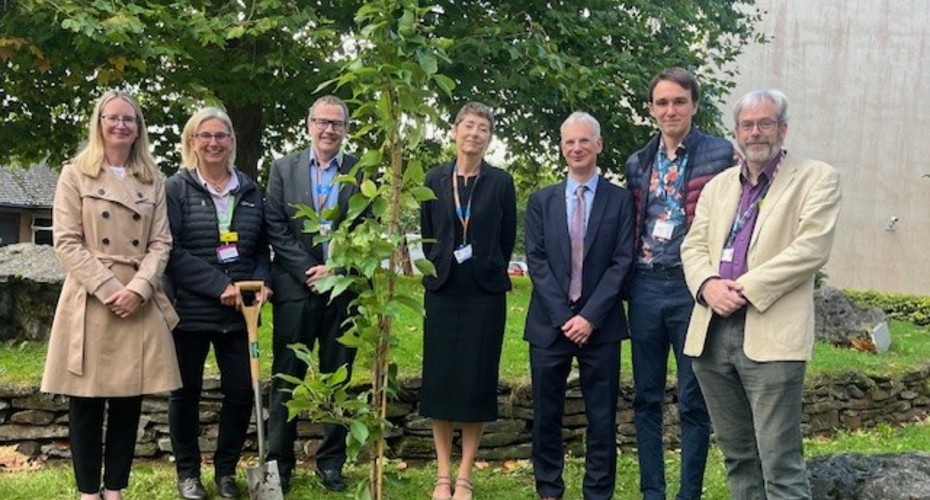Memorial trees planted at Royal Devon hospitals to honour health workers

Trigger warning: This references National Suicide Memorial Day for Health and Care Workers. We appreciate that this topic might be difficult for some colleagues, but we think it is vitally important to raise awareness. There is more information on support and training at the end of this post.
A memorial tree has been planted outside the Medical School’s Research, Innovation, Learning and Development (RILD) building at the Royal Devon and Exeter Hospital (RD&E) as a way to remember healthcare workers who have taken their own lives.
Statistics show that in the UK one doctor takes their own life every three weeks and one nurse takes their own life every week. These shocking figures are a stark reminder that the wellbeing of our healthcare workers is paramount.
By joining the Doctors in Distress’ National Memorial Tree Campaign and planting a memorial tree in Exeter and at North Devon District Hospital (NDDH), the Royal Devon University Healthcare (RDUH) NHS Foundation Trust is promoting a duty of care for the mental health of colleagues and remembering those who have lost their lives.
Tree planting ceremonies took place on Wednesday 17 September at both sites and were attended by representatives from the Medical School, members of the RDUH board, chaplaincy, and wellbeing teams, and colleagues from across the Trust who have been affected by the suicide of a colleague.
The tree at NDDH was planted in the garden of remembrance and the tree at the RD&E was planted outside the entrance of the RILD building. Both memorial trees have a plaque to commemorate those colleagues who have lost their lives to suicide.
The ceremonies took place on National Suicide Memorial Day for Health and Care Workers, which aims to honour those lost, acknowledge the challenges faced by those in the profession, and spark change to protect the mental health of healthcare staff today.
Professor Richard Holland, Dean of the University of Exeter Medical School, said: “We’re proud at Exeter to help develop and nurture the doctors, nurses, radiographers and other healthcare workers of the future, but it’s important to remember the huge sacrifices these professionals make to look after their patients.
“These trees are a tribute to those who have tragically taken their own lives and it’s a great privilege for one to be planted outside the University’s education and research centre at the RD&E, and likewise to have contributed to the tree planted at NDDH. Both trees honour their memories and are a reminder to us all to care for those who care for us.”
Dr Vanessa Purday, Chief Medical Officer at the Royal Devon, said: “Many of us who work in the NHS will have been affected by the loss of a colleague to suicide, so we hope that these trees will allow for those who have sadly taken their own lives to be honoured and remembered.
“We know that our colleagues are under enormous pressure every day, and the memorial trees are a symbol of the Royal Devon’s commitment to support the mental health and wellbeing of those who work here and give so much for the people they care for. As we remember those we have lost, it’s vital we protect those who are still here.”
The National Memorial Tree Campaign is led by the medical mental health charity Doctors in Distress and in association with its Patron, BAFTA winner and former NHS doctor Adam Kay.
Doctors in Distress is an independent charity that provides peer support for all UK-based healthcare workers to promote and protect their mental health and prevent suicide.
Our University takes the wellbeing of students and colleagues very seriously and is committed to working on the University Mental Health Charter (UMHC). The UMHC is a set of principles that universities work towards to improve the mental health and wellbeing of their communities by encouraging universities to achieve a whole-university approach, which aims to improve mental health and wellbeing outcomes for our colleagues and students. As part of this, we endeavour to raise awareness of mental health difficulties and signpost colleagues to suitable support.
Anyone can experience suicidal thoughts, and many colleagues have kindly shared their personal stories and how they have found support on the This is Me page. Further wellbeing support for colleagues is also available on the Colleague Wellbeing webpages and for students on the Wellbeing Services webpages.



